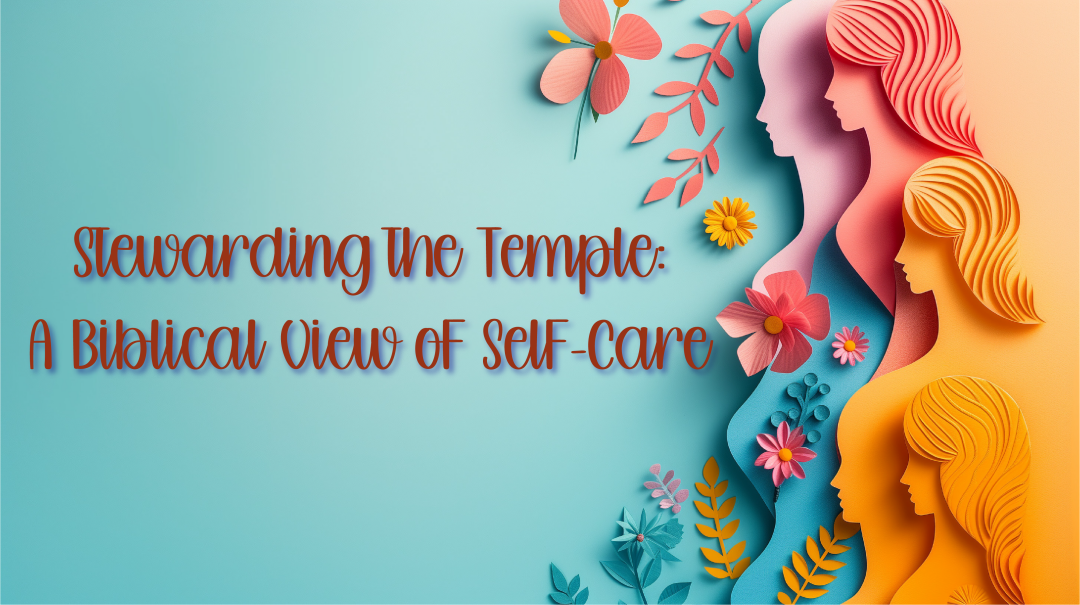
Self-care. It is a term we hear everywhere—from spa days to “hot girl walks” and everything in between. But for many of us, self-care feels out of reach. “That is not in the budget.” “I do not have time.” And if we do take time for ourselves, guilt creeps in. It feels selfish—like a luxury we cannot afford. Can you relate?
Recently, I have been studying the Old Testament and pondering the fact that God filled the Tabernacle (and later the Temple) with His Presence and how that relates to us having His Spirit in us. Now, through the Holy Spirit, we are God’s temple (1 Corinthians 6:19). That changes everything. Caring for ourselves is not self-indulgence; it is stewardship. We are God’s dwelling place.
Having God’s Spirit in me then places self-care in a different light. It now becomes about stewarding God’s property, even though our culture tells me it is my body. It means following the rhythms of work and rest that God and Jesus showed us by example. Jesus cared deeply for people, ministering to them in every way, teaching, feeding, and healing them, yet He took time alone to rest and pray (Luke 5:16). If Jesus, being both God and man, needed time alone to rest and pray, I also need that time. That time is caring for this Temple of God; it is truly caring for ourselves as if we were caring for something that belongs to God.
Reframing self-care as stewarding God's property brings a few other thoughts. It means that practicing self-care is a way to honor God and maybe even worship. I am obeying God’s command to rest, as found in Exodus 20. When I am rested, and my person is cared for, I am better able to pour into others. I once heard Eleanor Saunders teach about serving. She used the illustration of us as farmers who are planting seeds. Imagine having a bag full of seeds that you are tossing out as you go. You toss seeds here and there and everywhere.
Let’s look at what it means. The bag represents yourself. The seeds represent all the ways you give of yourself: shopping, cooking, cleaning, caring for family, working, serving—basically taking care of yourself and others. When the bag is empty, many of us keep giving of ourselves instead of taking time to refill the bag. There is a saying I hear a lot in leadership circles that says “You can’t give what you don’t have.” So often, we give from what we don’t have. We feel tired, stressed, and eventually burnt out. All because we think self-care is a luxury we can’t afford instead of thinking of it as living within God’s design and intention for us.
So how do we do this self-care? What does it look like for a Christian to steward God’s Temple well? Those questions can be nuanced in their answers because God created us as unique individuals. What revives and rejuvenates one may be exhausting for another. We will look at the basics; feel free to add your preferences after the basics are well-developed in your life.
Steward your mind and body with rest
Have you ever thought of rest as an act of trust? When we pause, we place all our to-do lists in God’s hands and remember that He—not us—holds the world together (Acts 17:28).
Practical Steps:
- Take a regular Sabbath: 24 hours of rest, worship, and delight in the gifts God has given you.
- Prioritize regular sleep.
Care for your body
Often, we Christians act as if only our spiritual life matters. But God gave us bodies to carry out His work. Stewarding our physical health honors Him.
Practical Steps:
- Move your body: Walk, stretch, or follow medical advice.
- Eat nourishing foods.
- Make and keep routine medical appointments, even if you do not want to.
Nurture Your Mind and Emotions
God created us with minds and emotions; both need care because we engage with God through both. “Emotional intelligence (EQ) is the ability to understand and manage our emotions and relate well to others.”1 Jesus modeled this with grace and truth.
Practical Steps:
- Limit screen time and media intake.
- Read books that stretch your thinking.
- Have meaningful, real-life conversations.
- Invest in relationships that go deeper than a "like" or "comment."
Spiritual
Just as our bodies and minds need care, so does our spirit. Being in God’s Word daily and staying connected with other believers keeps our souls nourished.
Practical Steps:
- Spend time in Scripture and prayer each day.
- Attend worship weekly—in person if possible.
- Join a small group for deeper fellowship and growth.
These are just a few basics of stewarding God’s temple, you. If you are doing the things listed above well, add on a spa day or whatever you would like. Self-care doesn’t have to be expensive. It just needs to give your mind, body, and spirit space to refresh. It just needs to refill your bag.
Personally, I am considering trying the hot girl walk; it is a real thing; ask a young lady you know.
Personal Reflection Questions:
- What part of my life (body, mind, or spirit) needs the most care right now?
- What boundaries do I need to set so I can rest?
- How can I invite God into my self-care rhythms this week?
FOOTNOTES
1 Burton, N. (2024, June 24). What is Emotional Intelligence? Retrieved May 2025, from Psychology Today: https://www.psychologytoday.com/us/blog/hide-and-seek/201608/what-is-emotional-intelligence

